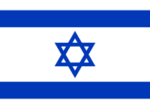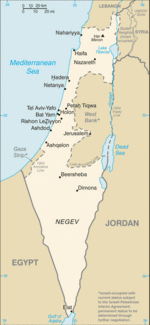State of Israel
The State of Israel is the modern government of a geographic area of Biblical origins, Israel. It declared independence on 14 May 1948, a date based on the expiration of the 1922 British Mandate of Palestine. [1] The declaration also referenced the United Nations General Assembly Resolution 1981 of 29 November 1947, which specified "Independent Arab and Jewish States and the Special International Regime for the City of Jerusalem"; Israel offered, in the declaration, to cooperate with the process described therein.[2]
Riots and terrorist incidents by both Arab and Jewish groups broke out days after the UN resolution. The 1948 Arab-Israeli War actually was in progress by January 1948, with battalion-sized engagements, well before the May declaration of independence. On May 15, however, the governments of Egypt, Syria, Iraq, Lebanon, Jordan and Saudi Arabia, with varying degrees of formality, declared war, a de facto recognition of the State of Israel, although most have never given de jure recognition; larger-scale war ensued. Bilateral armistices were agreed between January and June 1949, Jordan annexed the West Bank, and Gaza was taken under Egyptian control. An estimated 726,000 Palestinian refugees left or were driven from Israeli-held areas; an estimated Jews were stripped of citizenship or ejected from Arab countries. [3]
In the 1967 Arab-Israeli War, it took control of East Jerusalem, the West Bank, the Gaza Strip, collectively known as the Occupied Territories, as well as the Golan Heights.
Politically, Israel is a Western-oriented parliamentary democracy, identified as a Jewish state under the political philosophy of Zionism. Its current government is headed by Prime Minister of Israel Benjamin Netanyahu; President of Israel Shimon Peres is Head of State. Netanyahu's coalition is centered on his Likud party; its major coalition partner is Yisrael Beiteinu led by Avigdor Lieberman. While Likud is usually called right-wing, Yisrael Beiteineu is much farther in the nationalist direction, although both do not rule out a two-state solution. Centrist Kadima, headed by Tzipi Livni, now leads the Opposition in the Knesset; it drew the highest number of votes in the 2009 election but could not form a coalition.
Israel does have robust political debate and a free — even aggressive — press. While there have been some recent concerns over demanding "loyalty", especially from Lieberman, basic government policies are still challenged.
Government
Political parties
| Name | Alternate name | Leader | Positions |
|---|---|---|---|
| Balad Party | Brit Leumit Demokretit (Democratic National Joint). | Azmi Bishara | Arab; one-state solution |
| HADASH | Democratic Front for Peace and Equality | Muhammad Barakeh | |
| Kadima | Tzipi Livni | Centrist; two-state solution | |
| Labor Party (Israel) | Ehud Barak | Center-left | |
| Likud | Benjamin Netanyahu | Center-right; secular; two-state solution | |
| National Union (Israel) | NU | Yaakov Katz | Right; abrogates all agreements with Palestinian Authority |
| The Jewish Home | HaBayit HaYehudi | Daniel Herschkowitz | |
| SHAS | Eliyahu Yishai | Right, Sephardic | |
| Meretz | Haim Oron | Left; two-state solution; undivided Jerusalem | |
| United Arab List | Ta'al | Ibrahim Sarsur | |
| United Torah Judaism | UTJ; Yahadut HaTorah Hameukhedet | Yaakov Litzman | Right, ultra-Orthodox |
| Yisrael Beiteinu | YB | Avigdor Lieberman | Right, secular |
Parliament
The unicameral legislature is the Knesset, with 120 members elected by public popular vote; the last general election was on 10 February 2009 and thenext scheduled one is in 2013.
| Party | Percent of vote | Seats |
|---|---|---|
| Kadima | 23.2% | 28 |
| Likud | 22.3% | 27 |
| Yisrael Beiteinu | 12.1% | 15 |
| Labor Party (Israel) | 10.2% | 13 |
| SHAS | 8.8% | 11 |
| United Torah Judaism | 4.5% | 5 |
| United Arab List | 3.5% | 4 |
| National Union (Israel) | 3.4% | 4 |
| HADASH | 3.4% | 4 |
| The Jewish Home | 3.0% | 3 |
| The New Movement-Meretz | 3.0% | 3 |
| Balad | 2.6% | 3 |
Dissent
Recent editorials in major Israeli news media have challenged basic assumptions of the government, especially with respect to the 2009 Gaza conflict and policy towards Palestine. Larry Derfner, writing op-ed in the centrist Jerusalem Post, said
Who was the victim of Operation Cast Lead, them or us? No question - us. We Israelis were the victims and we still are. In fact, our victimhood is getting worse by the day. The Goldstone report was the real war crime. The Goldstone report, the UN debates, Amnesty International, Human Rights Watch, the Red Cross, B'Tselem, the traitorous soldiers of Breaking the Silence and the Rabin Academy - those were the true crimes against humanity. This is what's meant by "war is hell."...This imaginary monologue is how we actually see ourselves today. We initiated the war in Gaza, we waged one of the most one-sided military campaigns anyone's ever seen - and we're the victims...We're fighting off the world with the Holocaust; witness Prime Minister Binyamin Netanyahu at the UN with his Auschwitz props. "We won't go like lambs to the slaughter again," vowed his protégé, Finance Minister Yuval Steinitz, in a cabinet discussion of the Goldstone report...The truth is that the State of Israel has never been a victim, and our likening of ourselves to the 6 million has been embarrassing from the beginning - but now? After what we did in Gaza? With the stranglehold we have on that society, while we over here live free and easy?
"No, this has gone beyond embarrassing; this is out-and-out shameful...The reason we tell ourselves and the world that we are victims is because we know, whether we admit it to ourselves or not, that victimhood is power. Victimhood is freedom. A victim can't be told to restrain himself. A victim fighting for survival can't be accused of abusing his power because, after all, his back is to the wall, he's desperate." [4]
Haaretz[5] columnist Gideon Levy, wrote in a more liberal newspaper,
Now is the time to say to the United States: Enough flattery. If you don't change the tone, nothing will change. As long as Israel feels the United States is in its pocket, and that America's automatic veto will save it from condemnations and sanctions, that it will receive massive aid unconditionally, and that it can continue waging punitive, lethal campaigns without a word from Washington, killing, destroying and imprisoning without the world's policeman making a sound, it will continue in its ways."[6]
By no means, however, is the media one-sided. Also writing in the Jerusalem Post, Caroline Glick discussed the scheduled debate, at Brandeis University, between Richard Goldstone and Dore Gold. A student activist called on fellow anti-Zionists to disrupt the discussion.
On college campuses throughout the US, Israelis and supporters of Israel are regularly denied the right to speak by leftist activists claiming to act on behalf of Israel's "victims," or in the cause of "peace." In the name of the Palestinians or peace these radicals seek to coerce their fellow students into following their lead by demonizing and brutally silencing all voices of dissent. "[7]
Security
Israel contends with terrorism inside the country and unstable violence in the Occupied Territories. It has engaged in several major conventional wars beginning with its war of independence in 1948, and the Israeli Defense Forces are rated as among the most potent militaries in the world. The security system also include police and the Israeli intelligence community.
Economics
Roughly half of the government's external debt is owed to the US, its major source of economic and military aid. Israel was also the largest recipient of U.S. aid before the Iraq War, and remains second overall and highest in military aid.[8] The military financial relationship is complex; during the Cold War, the U.S. obtained significant intelligence benefits from Israel's wars, in which it captured Soviet equipment that it provided to the U.S. After the Cold War, there are some mutual development programs, such as the Arrow anti-ballistic missile, but more controversy about the strategic relationship.
Israel's GDP, after contracting slightly in 2001 and 2002 due to the Palestinian conflict and troubles in the high-technology sector, has grown by about 5% per year since 2003. The economy grew an estimated 3.9% in 2008, slowed by the global financial crisis.[9]
While there are excellent agricultural products, the core of the economy is high technology; this has been argued as a possible way for it to reduce economic dependency on the U.S.[10] Israel is a major arms manufacturer, and there have been a number of issues involving industrial espionage and export of U.S. controlled technology.
References
- ↑ Declaration of Establishment of State of Israel, Israeli Ministry of Foreign Affairs, 14 May 1948
- ↑ United Nations General Assembly (29 November 1947), United Nations General Assembly Resolution 181
- ↑ Jack Epstein (28 March 2004), "Jews who fled Arab lands now press their cause: Refugees' advocates link issue to Palestinians' claims on Israel", San Francisco Chronicle
- ↑ Larry Derfner (30 October 2009), "Rattling the Cage: Some victims we are", Jerusalem Post
- ↑ Wikipedia has an article on Haaretz.
- ↑ Gideon Levy (1 November 2009), "America, stop sucking up to Israel", Haaretz
- ↑ Caroline Glick (29 October 2009), "Column One: Silencing dissent in America", Jerusalem Post
- ↑ Curt Tarnoff, Larry Nowels (April 15, 2004), Foreign Aid: An Introductory Overview of U.S. Programs and Policy, Congressional Research Service
- ↑ Central Intelligence Agency, Israel, The World Factbook
- ↑ Shmuley Boteach (October 28, 2009), "Let's hear it for high-tech Israel", Jerusalem Post via Israel21c

